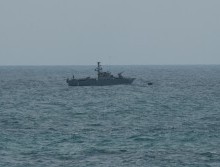
Israel and Lebanon are set to start negotiations to resolve their maritime border dispute in the Mediterranean Sea soon, after reaching what the United States called a “historic agreement” on a framework for the talks. The water border is critical for determining drilling rights for natural gas in the shared sea, and the talks could determine much more than that.
“The agreement between the two parties on a common framework for maritime discussions will allow both countries to begin discussions, which have the potential to yield greater stability, security, and prosperity for Lebanese and Israeli citizens alike,” US Secretary of State Mike Pompeo said in a State Department press release on Friday. The decision to hold the talks was brokered by the US and followed almost three years of American diplomacy. The US will mediate the negotiations.
Israeli Foreign Minister Gabi Ashkenazi thanked the US for their role in a series of posts on Twitter, calling the start of talks an “important step.” Tweeted Ashkenazi, “I believe that success in the talks will significantly contribute to the stability of the region and promote prosperity for the citizens of both Israel and Lebanon.”
The talks are the third diplomatic breakthrough in less than two months between Israel and Arab nations technically at war with them—all mediated by the United States. Previously, Israel reached peace accords with the United Arab Emirates and Bahrain.
While just starting talks on a border dispute with Lebanon is a far cry from those peace deals, it’s noteworthy that Israel will be able to even negotiate a border with a country whose government is heavily influenced by the Hezbollah terrorist group. In the US statement, Pompeo said the announcement is a “vital step forward that serves the interests of Lebanon and Israel, of the region, and of the United States.”
Those interests would presumably include determining rights to natural gas resources in the Mediterranean Sea. The area separating the naval territory claimed by Israel and Lebanon has potential natural gas drilling sites on both sides of the border. The MEES energy media agency reported in June that Israel had put out bids on a gas field block that lies along the disputed border, with a map showing the Israeli field is in the same area where a Lebanese gas field block is located on the other side of the border dispute.
Israeli Energy Minister Yuval Steinitz, in a Hebrew post to Twitter translated by Google, said of the border talks with Lebanon: “We look forward to the opening of negotiations soon. The goal is to bring an end to the dispute over the demarcation of economic waters between Israel and Lebanon.”
The BBC report on the agreement to negotiate cited Steinitz as also saying the talks with Lebanon would begin after Israel’s Feast of Tabernacles holiday that runs through October 10.
Pompeo, in the US State Department press release on the talks, said they would be held in Naqoura, Lebanon under the flag of the United Nations. And making the negotiations even more impactful, the maritime border won’t be the only topic on the table.
Pompeo said the US also “looks forward to separate expert-level talks to define unresolved issues” related to the Blue Line that marks the ceasefire line between Israel and Lebanon. Pompeo said those additional discussions “offer the promise of another positive step for regional stability.”
(By Joshua Spurlock, www.themideastupdate.com, October 4, 2020)
